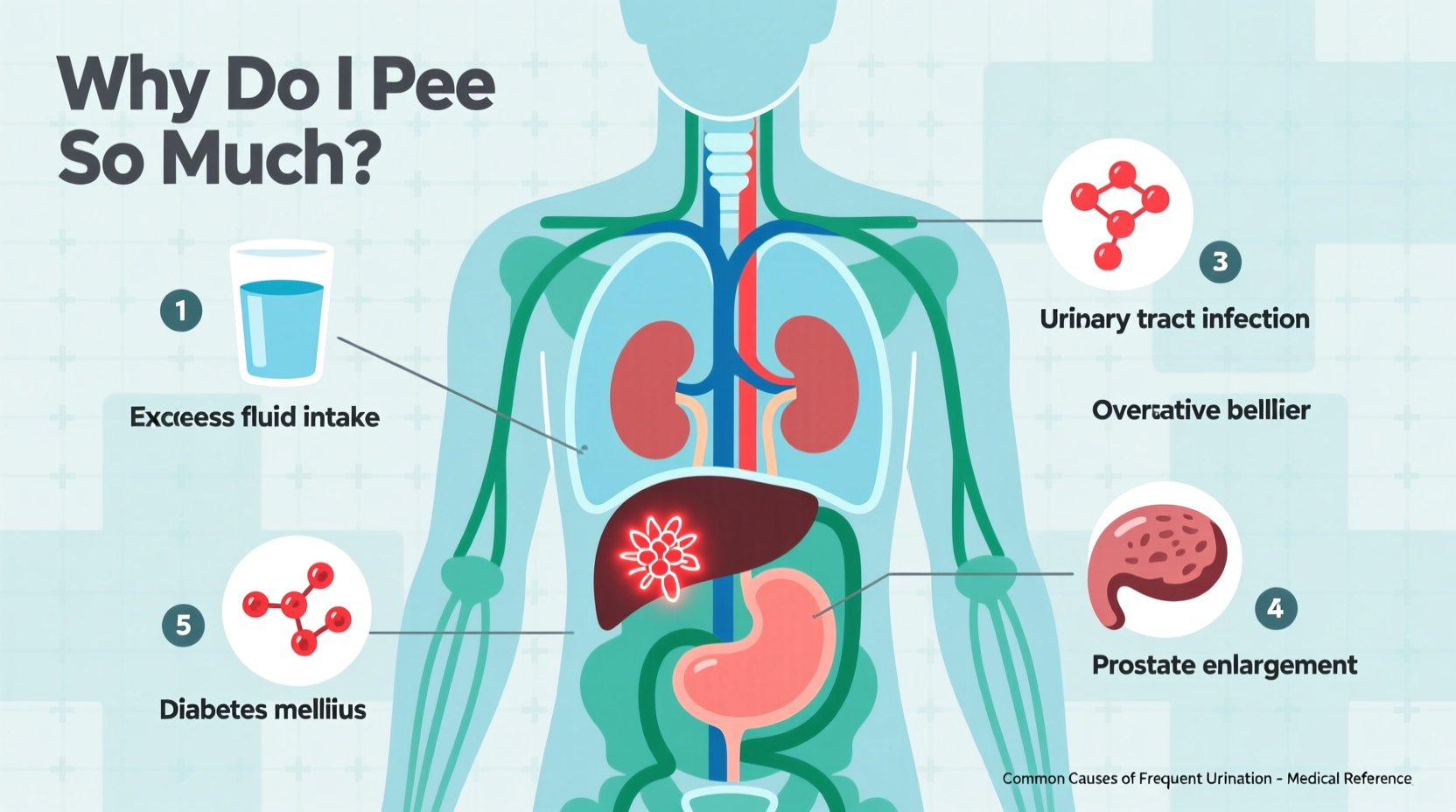Frequent urination affects millions of people worldwide, yet many hesitate to discuss it openly. While occasionally needing the bathroom more than usual is normal, consistently high urinary frequency can interfere with daily life and may signal an underlying condition. Understanding the root causes—ranging from lifestyle habits to medical disorders—is essential for effective management. This article explores the most common reasons behind excessive urination, offering insight into when to seek help and how to regain control.
What Is Considered Frequent Urination?

Most adults urinate between four and eight times per day. Going more than that, especially if it disrupts sleep or concentration, may qualify as frequent urination. Nocturia—waking up two or more times at night to pee—is one specific form that significantly impacts quality of life. Frequency alone isn’t always problematic; context matters. For example, drinking large amounts of fluid before bed naturally increases nighttime trips to the bathroom. But when urgency, discomfort, or volume changes accompany frequent voiding, further evaluation becomes necessary.
Lifestyle and Behavioral Factors
Diet and daily habits play a major role in urinary patterns. Certain substances stimulate the bladder or increase urine production:
- Caffeine: Found in coffee, tea, chocolate, and some sodas, caffeine acts as a diuretic and bladder irritant.
- Alcohol: Suppresses antidiuretic hormone (ADH), leading to increased urine output.
- Artificial sweeteners: Some individuals report increased urgency after consuming aspartame or saccharin.
- Spicy foods and acidic fruits: Can irritate the bladder lining, particularly in sensitive individuals.
Medical Conditions Linked to Frequent Urination
Beyond lifestyle influences, several medical conditions are known contributors to excessive urination. Identifying these early improves outcomes and prevents complications.
Diabetes Mellitus and Diabetes Insipidus
One of the hallmark signs of both type 1 and type 2 diabetes is polyuria—excessive urine production. High blood glucose levels force the kidneys to work harder, pulling more water into the urine. This leads not only to frequent urination but also intense thirst (polydipsia). Left untreated, this cycle worsens dehydration and blood sugar imbalance.
Rarer is diabetes insipidus, a condition where the body cannot regulate water balance due to issues with antidiuretic hormone (ADH). Despite normal blood sugar, patients produce large volumes of dilute urine and feel constantly thirsty.
“Persistent urination without elevated glucose should prompt investigation beyond standard diabetes screening.” — Dr. Lena Patel, Nephrologist and Urinary Health Specialist
Urinary Tract Infections (UTIs)
UTIs are among the most common causes of sudden-onset frequent urination. Bacteria, usually E. coli, invade the urinary tract, causing inflammation. Symptoms include urgency, burning during urination, cloudy or strong-smelling urine, and pelvic discomfort. Women are disproportionately affected due to anatomical differences.
Even mild infections can create a sensation of incomplete emptying, prompting repeated attempts to urinate despite little output.
Overactive Bladder (OAB)
OAB is a clinical syndrome characterized by urgency, frequency, and often nocturia—with or without incontinence. It results from involuntary contractions of the detrusor muscle in the bladder wall. While more common in older adults, OAB can affect younger individuals, especially those under chronic stress or with neurological conditions.
Prostate and Pelvic Health Issues
In men over 50, benign prostatic hyperplasia (BPH)—enlargement of the prostate gland—is a leading cause of urinary frequency. As the prostate grows, it compresses the urethra, obstructing urine flow. The bladder must contract harder to expel urine, eventually becoming overactive and hypersensitive.
Women may experience similar symptoms due to pelvic floor weakness, often following childbirth or menopause. Loss of estrogen reduces urethral tone and support, increasing sensitivity and frequency.
| Condition | Primary Symptoms | Commonly Affected Group |
|---|---|---|
| Benign Prostatic Hyperplasia (BPH) | Frequency, weak stream, straining, nocturia | Men over 50 |
| Urinary Tract Infection (UTI) | Urgency, burning, cloudy urine, frequency | Women, sexually active individuals |
| Overactive Bladder (OAB) | Urgency, frequency, nocturia ± leakage | All genders, more common with age |
| Type 2 Diabetes | Polyuria, excessive thirst, fatigue | Obese, sedentary, family history |
Medications and Fluid Balance
Certain medications increase urine production as part of their mechanism. Diuretics, prescribed for hypertension or heart failure, are designed to flush excess fluid from the body. Common examples include furosemide, hydrochlorothiazide, and spironolactone.
Other drugs with diuretic-like effects include lithium (used in bipolar disorder), certain antipsychotics, and even high-dose vitamin C supplements. Always review your medication list with a doctor if you notice new-onset frequency.
Fluid Intake: Quantity vs. Timing
Drinking adequate water is vital, but timing matters. Consuming most fluids in the evening leads to nocturia. Similarly, gulping large amounts at once rather than sipping throughout the day overwhelms the kidneys’ ability to concentrate urine efficiently.
When to See a Doctor: Red Flags
Frequent urination isn’t always dangerous, but certain warning signs warrant prompt medical attention:
- Pain or burning during urination
- Blood in the urine (hematuria)
- Inability to urinate despite urgency
- Sudden weight loss or extreme fatigue
- Fever or flank pain (possible kidney infection)
- Unquenchable thirst alongside frequent peeing
If symptoms persist beyond a few days or interfere with work, sleep, or social activities, consult a healthcare provider. Diagnostic tools such as urinalysis, blood glucose tests, ultrasound imaging, or urodynamic studies can pinpoint the cause.
Mini Case Study: Recognizing Early Diabetes
Mark, a 47-year-old office worker, began waking up twice nightly to urinate. He dismissed it as aging until he started feeling unusually tired and thirsty. After drinking up to three liters of water daily and still feeling dehydrated, he visited his primary care physician. A simple finger-prick test revealed a blood glucose level of 240 mg/dL—well above normal. Further testing confirmed type 2 diabetes. With dietary changes, metformin, and regular monitoring, Mark’s symptoms resolved within weeks. His case underscores how urinary frequency can be an early, reversible warning sign of systemic disease.
Action Plan: Managing Frequent Urination
Whether addressing a temporary trigger or managing a chronic condition, a structured approach yields better results. Follow this checklist to assess and improve your situation:
📋 Frequency Reduction Checklist
- Track fluid intake and urination times for 3–5 days.
- Eliminate caffeine and alcohol for one week to assess impact.
- Shift fluid consumption earlier in the day; stop drinking 2 hours before bed.
- Perform pelvic floor exercises (Kegels) twice daily to strengthen bladder control.
- Schedule a doctor’s visit if symptoms persist or worsen.
- Request a urinalysis and fasting blood glucose test.
- Review all medications with your physician for possible side effects.
FAQ
Can anxiety cause frequent urination?
Yes. Anxiety activates the sympathetic nervous system, which can heighten bladder sensitivity and trigger urgency. Stress-related frequency often occurs without infection or structural issues and tends to fluctuate with emotional state.
Is it normal to pee every hour?
No. Urinating hourly typically indicates excessive fluid intake, bladder irritation, or an underlying condition like infection, overactive bladder, or uncontrolled diabetes. Evaluation is recommended if this pattern persists.
Why do I pee more as I age?
Aging affects bladder capacity, muscle strength, and hormone regulation. The bladder holds less urine, contracts more easily, and produces less ADH at night, increasing nocturnal urine production. However, significant changes should never be assumed as “just part of aging” without assessment.
Conclusion
Frequent urination is more than a minor inconvenience—it can be a window into your metabolic, hormonal, and neurological health. While lifestyle choices often contribute, dismissing persistent symptoms risks missing serious conditions like diabetes, infection, or prostate disease. By paying attention to patterns, adjusting habits, and seeking timely care, you can restore comfort and confidence. Don’t normalize what might be a preventable or treatable issue. Take charge of your urinary health today.









 浙公网安备
33010002000092号
浙公网安备
33010002000092号 浙B2-20120091-4
浙B2-20120091-4
Comments
No comments yet. Why don't you start the discussion?